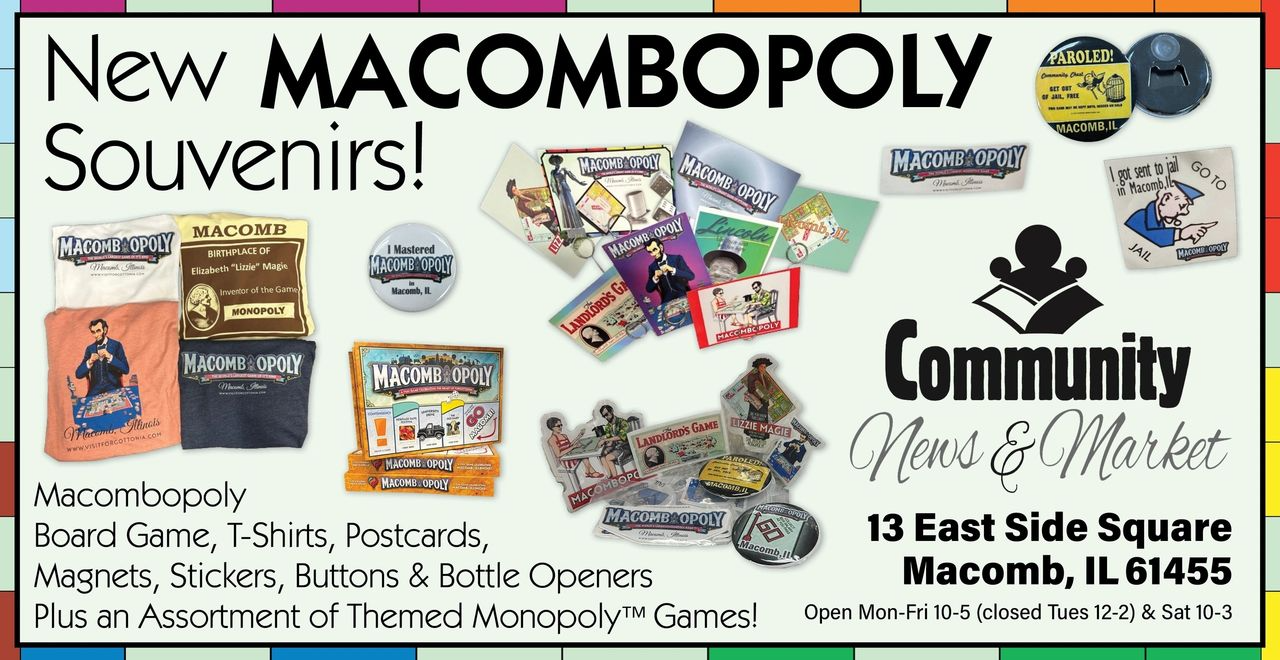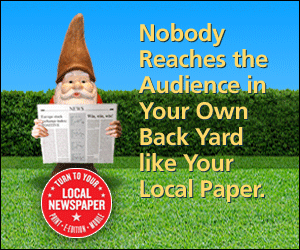Two Tales of a City
A YouTube channel, showcasing the still-accessible dream of home ownership in Macomb and surrounding areas.
A community lending funding, helping aspiring entrepreneurs purchase turnkey businesses from retiring professionals.
A folk school, connecting generations of learners and teachers through art, craft, and music.
A children’s museum, offering family edu-tainment through interactive art, history, and science installations.
A weekly music performance and radio broadcast featuring midwestern talent.
A boutique hotel experience, a community podcast, a film studio, a regional arts & culture newsletter, a food forest, community composting, a small business incubator, a co-working and makerspace, a labor-share club, a tool library, a bike trail, a vegetarian cafe, a Food Not Bombs chapter, a sidewalk art gallery… These are just a handful of the ideas, some already in development, that I’ve discussed with friends and neighbors in Macomb over the past year.
On Sunday, the Wall Street Journal prominently (and unflatteringly) featured Macomb in its feature America’s College Towns Go From Boom to Bust. The article focused on current downward economic trends facing many state universities, which were, its authors argued, ‘failing the local economies they once fostered.’
The thesis is a familiar one: hints of Steinbeck, Hillbilly Elegy, Dorothea Lange’s Depression-era photos. Dustbowl adjectives describe an empty, weedy, faltering, once booming, suffering, struggling, abandoned Macomb. ABANDONED, y’all! Queue the melancholia: We’ve been caricaturized. MACOMB, IL: A poor but decent salt-ofthe- earth community, helplessly ravaged by economic forces outside of its control. How sad for them. The End.
My reading was interrupted twice by texts from a local contractor. The bids for the Macomb Arthouse renovation were ready.
NAIVE MELODY
I moved to Macomb from Albuquerque, NM in 2022 because (to borrow from our pal Henry David), ‘I wished to live deliberately.’ After decades of urban hustle, I was eager to trade daily commutes for morning walks and sonic booms for birdsong (laugh all you want at my cloying sentimentality; if you’re reading this in Macomb, The Birds are your backing track).
Macomb’s historic downtown signifies something of the unique culture and values here: a food co-op, a yoga studio, a coffee shop, two bookstores, antiques, comics, restaurants, a quilt shop, an art center, a yarn shop, a wine seller, artists’ studios, a regional museum, a music shop, a public library, a pottery studio, a local newspaper… There is community here, and culture, and engaged curiosity, and creativity, and beauty, and hospitality.
Despite being orders of magnitude smaller than any city I’ve lived in, there is never not something to do in Macomb: farmer’s markets, plein air painting, a ceramics class, a University lecture, a book club, so many book clubs, a live music performance, a play, a student recital, a trivia night, a story hour, a guided nature tour, dinner and a movie, an art exhibit, a festival, a parade, a sporting event, an open mic night, a book sale, a yoga class, a civic or feminist or fiberarts group meet-up, a million and one volunteer opportunities… There are murals and public arts projects and citizen-led beautification projects, public parks, nature preserves, lakes, trails, boat and kayak rentals, free community vegetable gardens, thrift stores and antique shops, free public transportation, college and public radio, a prairie labyrinth, a dog park, disc golf, a skate park, outdoor family movie nights… If you find yourself complaining that Macomb is a boring place to live, I have some unfortunate news for you.
THIS MUST BE THE PLACE
It’s a fairy tale. This year, the backyard apple tree will have grown big enough to harvest from my kitchen window. I have friends who share their pawpaw harvest with me in the fall (protip: get yourself a pawpaw friend). I trade yogurt cultures with my neighbors. I journal every morning. I make pesto with basil from my neighborhood Giving Garden. As I type, a deer, no more than six feet away from me, is staring down my cat in the window. I regularly share my afternoons with groundhogs and rabbits and possums and squirrels. With condolences to my gardening friends, this is the magic of Macomb.
At the risk of sounding morbid, I hope to die here, and not anytime soon.
In 2023, I formed the Macomb Creative Collab as a way to shout this ‘town of splendid multitudes’ from the mountain…er…hilltops. These efforts have fostered connections between people, projects, and ideas which might otherwise have remained invisible to me, and which I have little doubt remain invisible to visiting journalists from national newspapers. Most excitingly, it has fostered introductions to a cohort of Macomb newcomers who moved here with intention: people, who, like me, discovered Macomb and said not ‘this’ll do,’ but ‘This is the place.’
A GLITCH IN THE MATRIX It’s tempting to try to insulate the life I’ve created here from local, regional, and global economic realities, to feel annoyed by the Wall Street Journal article, to paint its big city authors as having carelessly exploited Macomb in order to craft a predetermined and disingenuous narrative of small town America. It’s tempting to level accusations of cherry- picking and excluding more optimistic narratives of the region.
[I’ll pause here to add that since writing this, at least 5 friends associated with WIU have messaged me to say that their more optimistic outlook on the University’s future, shared with the WSJ, was excluded from the article.] It’s tempting to feel that of all publications, the WSJ should understand the potential downstream economic impact of the public sentiment it helps to foster.
But lead us not into temptation.
The WSJ article isn’t familiar because its authors were lazy or predatory or uncharitable or out of touch (as cathartic as it feels to levy those accusations). It’s familiar because this story has been playing on a loop since the 1930s: Rural America courts large economic driver. Economic conditions change. Rural community is abandoned and left destitute, searching for its next smokestack suitor. Rinse, repeat.
THE DESERT OF THE REAL This world is better than Utopia because – and follow this point carefully – you can never live in Utopia. Utopia is always somewhere else. -Brad Warner Higher Education, like nearly every conceivable economic driver on the planet, is changing rapidly and radically in the age of artificial intelligence and beyond. Government funding is increasingly politicized and tenuous. Seismic economic and cultural shifts will continue to increase exponentially in both size and frequency.
We can no more prevent these trends than we can dam a river by standing in it.
Much has been said in recent years about the ever-widening gap between working Americans and the investor class, a reality which makes the Wall Street Journal’s visit to Main Street Macomb seem improbable, if not outright ironic.
In a startup economy largely bolstered by venture capital, multi-year, multi-billion dollar losses are considered ‘innovative growth strategies.’ Still tethered to a reality-based accounting system, working families, small coffee shops and clothing stores, and even state universities are not so lucky.
There is value in being honest about the hard (in both senses of the word) economic data that declining enrollment and layoffs have wrought on our community, and value in holding space for our neighbors to share their grief, fear, and material needs with us. I am grateful to the Journal for telling that part of the story.
But what I see happening at WIU doesn’t look like an ending; it looks like the beginning of an honest assessment of real economic conditions: a mature acknowledgement that a smaller, financially stable university will, in the long run, benefit the community far more than a large university that is surviving on fumes and frenetic obfuscation.
It’s not dying. It’s breathing.
THE COMMODITY OF NO COMMODITY In his essay ‘How I Became an Enemy of the People,’ Doug Rushkoff recounts posting on a neighborhood message board after being robbed at gunpoint outside of his Brooklyn apartment. To the author’s surprise, his neighbors did not respond with empathy, concern, or gratitude for the warning, but were angry with Rushkoff for not understanding that posting openly about neighborhood crime would decrease their property values.
Earlier this week, I posted a quick defense of Macomb in the comments section of the Wall Street Journal article. I was met with the following question from a fellow reader: “Do you (Macomb) produce anything of unique value?” I bristled, remembering, albeit vaguely, a world before message boards and comment sections. And then I scrolled upward: WSJ → MENU → MARKETS & FINANCE.
Carbon Emissions from AI and Crypto Are Surging. Coinbase stock up 5.9%.
More Social Media, More Depression: Study Links Cause and Effect. Meta stock up .23%.
Americans’ credit card debt reaches new record high. Mastercard stock up .11%.
Do you produce anything of unique value?
20 years into Facebook, Americans are craving the real-life connections, community, and great outdoors that we naively ceded to an algorithm two decades ago. 30 years into Amazon, we are returning to local bookstores, small retailers, and third places. We have seen the digital promised land, and we want our lives back.
This summer, the Macomb Arthouse Project (MAP) begins its first large-scale renovation on West Adams Road. The multi-unit property will house three artist- curated short-term rentals and a creative co-working space for Macomb residents, visitors, and students.
IMAGINAL MACOMB
What lies behind us, and what lies before us, are tiny matters compared to what lies within us. -Ralph Waldo Emerson The small towns, small businesses, and even large institutions that thrive in the 21st century will be those that trust in the creative process of dissolution and reformation. The future of Macomb belongs to a growing community that is not just prepared, but excited to let go of economic models which no longer serve us.
Macomb already contains the seeds of its own salvation. Recognizing, celebrating, and communicating the inherent wealth of a community which centers human connection over market capitalization frees us to foster corporate and institutional relationships based on mutuality rather than codependency, shared values rather than desperation.
I look forward to the Wall Street Journal’s follow-up story. I’ll even throw in a few adjectival suggestions for good measure: sustainable, resilient, creative, innovative, collaborative, human-centered, affordable, asset-based, intergenerational, equitable, charming, thriving, alive.
Amanda Dean is a Licensed Social Worker, semi-professional cat herder, and the founder of Macomb Creative Collab (MC²), an asset-based community network. Read more at https:// noplacelikemacomb.com/ love-letters/






